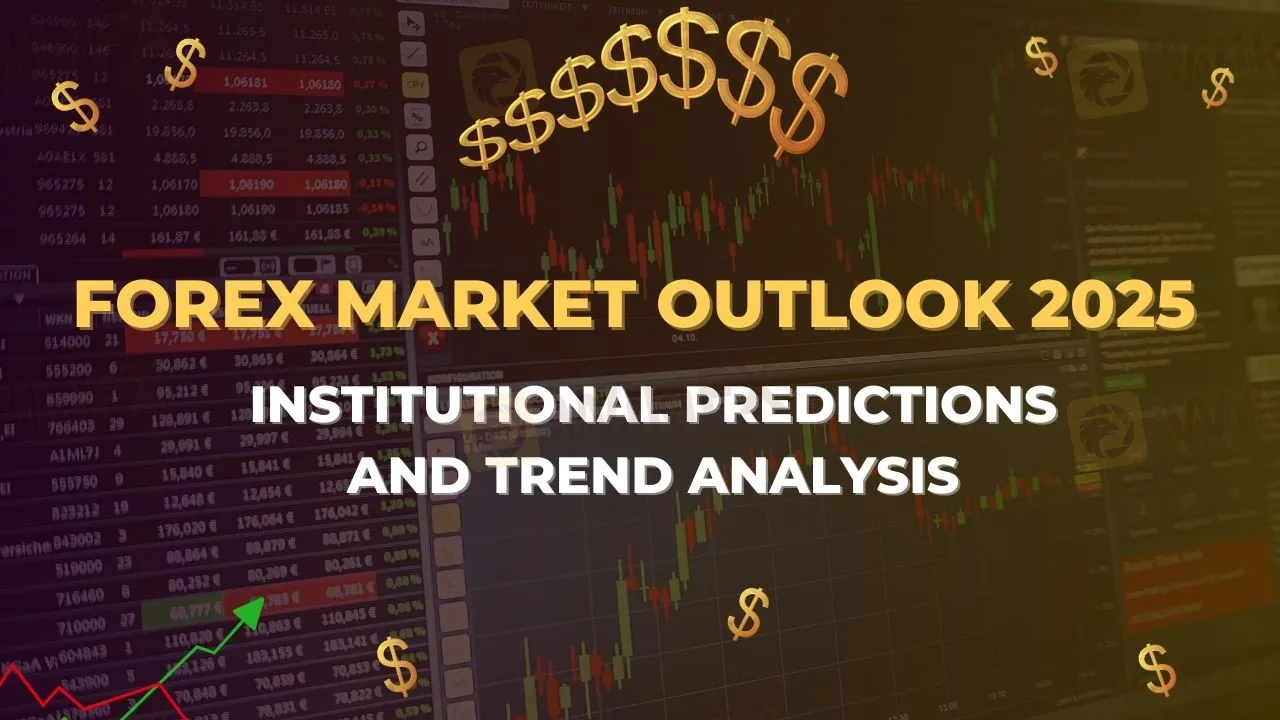简体中文
繁體中文
English
Pусский
日本語
ภาษาไทย
Tiếng Việt
Bahasa Indonesia
Español
हिन्दी
Filippiiniläinen
Français
Deutsch
Português
Türkçe
한국어
العربية
Forex Market Outlook 2025: Institutional Predictions and Trend Analysis
Abstract:In 2025, the global forex market faces a range of complex macroeconomic and geopolitical challenges. From shifts in U.S. monetary policy to structural issues in Europe’s economy and potential volatility in emerging markets, financial institutions worldwide are offering forecasts for the year ahead. This article compiles insights from leading organizations to explore potential trends and opportunities in the forex industry for 2025.

Overall Market Outlook
Most financial institutions agree that global economic growth will slow in 2025, with inflation gradually easing. However, the pace of recovery will vary across regions. The Federal Reserves monetary policy remains a key focal point. Goldman Sachs and JPMorgan predict that the Fed will likely adopt a cautious approach to rate cuts, with no more than two reductions throughout the year to address persistent core inflation. This strategy may help prevent market overheating but could also keep the U.S. dollar strong in the short term.
Meanwhile, Europes economic recovery appears more challenging. Manufacturing sectors in core economies like Germany and France remain sluggish, and the European Central Bank (ECB) may need to implement additional easing measures to support growth. Citigroup highlights that policy uncertainty and trade risks in the eurozone could exacerbate market volatility. Emerging market currencies are also expected to be significantly influenced by global economic conditions and capital flows. Morgan Stanley warns that emerging markets may face greater pressure in adjusting to global rate changes, especially export-dependent economies.
Forex Industry
Forex market volatility is expected to increase further in 2025. JPMorgan emphasizes that interest rate differentials, trade policies, and geopolitical risks will be key drivers of market dynamics. Investors should exercise caution when selecting currency pairs, particularly USD/EUR, USD/JPY, and GBP/USD.
Technological innovation is also transforming the forex industry. The widespread adoption of high-frequency trading and algorithmic trading has significantly increased market responsiveness, requiring traders to process information more quickly. This evolution demands higher technical proficiency from both trading platforms and investors. Additionally, changes in regulatory environments could have far-reaching implications for the industrys structure.
Major Currency Pairs
- USD: The U.S. dollar remains the central focus of the forex market. According to Bank of America, the dollars long-term trend could be supported by capital inflows, but weaker-than-expected U.S. economic data may lead to periodic pullbacks. The dollar index, which broke the key resistance level of 106.11 at the end of 2024, could climb further to 109.33.
- EUR: The euros outlook in 2025 appears bleak. Analysts from China International Capital Corporation (CICC) suggest that structural weaknesses in the eurozone economy, combined with expectations of continued ECB rate cuts, will likely put downward pressure on the euro against the dollar. Goldman Sachs forecasts that the euro could approach or fall below parity with the dollar in the latter half of the year, especially amid rising geopolitical risks.
- GBP: Despite showing some resilience, the British pound faces limitations due to inflationary pressures and overvaluation. Analysts predict that GBP/USD could experience a brief rally early in the year due to adjusted economic expectations, but its overall trajectory may be influenced by global trade dynamics.
- Emerging Market Currencies: Relatively stable currencies like the Indian rupee may perform well, while others could face pressure from trade tensions and capital outflows. UBS advises investors to be cautious of volatility in emerging market currencies, particularly in economies heavily reliant on external demand.
Conclusion
The forex market in 2025 is fraught with uncertainty and challenges. From U.S. monetary policy shifts to the eurozones economic struggles and potential volatility in emerging markets, investors must stay informed about institutional forecasts and market trends. Adopting flexible and forward-looking trading strategies will be crucial in navigating market fluctuations. In this interconnected global forex market, seizing opportunities while mitigating risks is essential for success.
Disclaimer:
The views in this article only represent the author's personal views, and do not constitute investment advice on this platform. This platform does not guarantee the accuracy, completeness and timeliness of the information in the article, and will not be liable for any loss caused by the use of or reliance on the information in the article.
Read more

LiteForex Celebrates Its 20th Anniversary with a $1,000,000 Challenge
The brokerage firm LiteForex has launched a trading contest with a massive prize pool exceeding $1,000,000. Running from January 1 to December 31, 2025.

Elderly Ipoh Man Loses Nearly RM1 Million in Online Investment Scam
An elderly man in Ipoh, Malaysia, has fallen victim to an online investment scam, losing RM974,000 in the process. The 67-year-old’s ordeal came to light after he lodged a report with the Ipoh district police on January 11, 2025.

Housewives Scammed of Over RM1 Million in Gold Investment Fraud
A fraudulent gold investment scheme has caused significant financial losses for 44 individuals, predominantly housewives, in Kelantan, Malaysia. The victims, collectively, have lost over RM1 million to the scheme, according to the Malaysia International Humanitarian Organisation (MHO).

Singapore Blocks Polymarket Access, Following U.S. and France
Singapore blocks Polymarket over gambling violations. Similar bans in France and the U.S. show growing regulatory scrutiny on decentralized platforms globally.
WikiFX Broker
Latest News
Wolf Capital Exposed: The $9.4M Crypto Ponzi Scheme that Lured Thousands with False Promises
Confirmed! US December non-farm payroll exceeded expectations
Spain plans 100% tax for homes bought by non-EU residents
90 Days, Rs.1800 Cr. Saved! MHA Reveals
The Yuan’s Struggle: How China Plans to Protect Its Economy
LiteForex Celebrates Its 20th Anniversary with a $1,000,000 Challenge
400 Foreign Nationals Arrested in Crypto Scam Raid in Manila
Singapore Blocks Polymarket Access, Following U.S. and France
OneZero Collaborates with Ladies Professional Golf Association (LPGA)
Housewives Scammed of Over RM1 Million in Gold Investment Fraud
Currency Calculator






